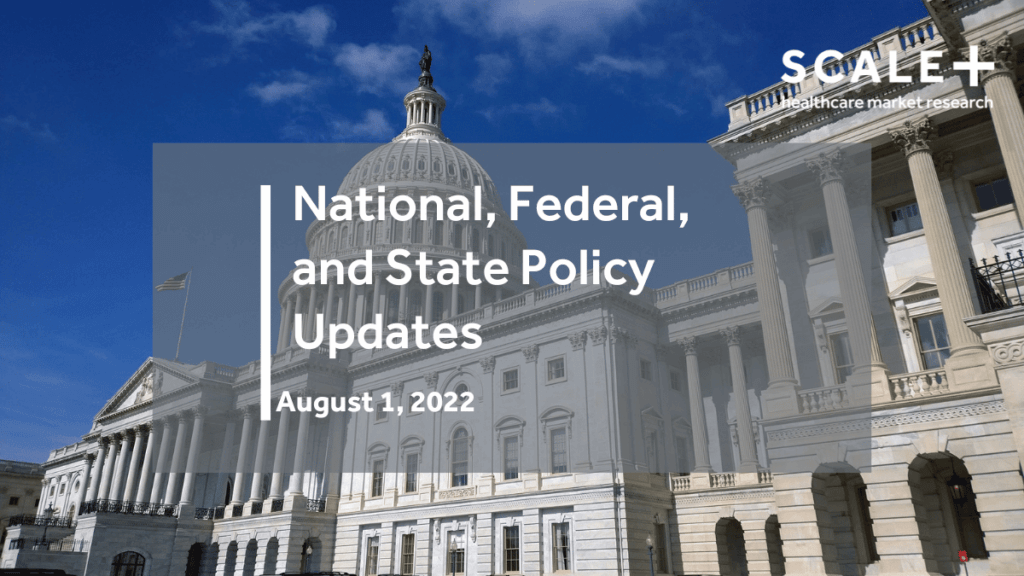National, Federal and State Policy Updates: July 20, 2022
Spotlight on Pediatrics
- On August 1, CMS outlined a roadmap for a new state Medicaid option in a federal guidance document on a health home benefit for children with complex medical conditions. Health homes are a way for states to provide home-based services for those with chronic conditions including care coordination and patient support services. The state plan option also requires that children be able to access specialty services from out-of-state providers to help coordinate care as families must often travel long distances to access specialty care. Eligible children must have one or more chronic conditions and a life limiting illness/rare pediatric disease. States are directed to submit state plan amendments (SPAs) for this new option, and in return, CMS promises to increase federal matching funding by 15% for the first 2 quarters that the SPA is active. States will have this option available to them starting on October 1 this year and follows a request for information on coordinating care for medically complex conditions.
Federal Policy Updates
Senate Passes Reconciliation Bill with Medicare Negotiation
- On August 7, the Senate passed the Inflation Reduction Act after securing the support of Kristen Sinema (D-AZ) and Joe Manchin (D-WV). The support of centrist Democrats clears the way for the passage of the bill which includes Medicare negotiation and other drug pricing provisions, ACA commercial health insurance subsidies, corporate tax changes to reduce the deficit, and investments in green energy and manufacturing. The bill was passed in a 51-50 tie-breaker vote and will now be sent to the House for approval before being sent to the President for signature.
CMS Publishes an RFI on Medicare Advantage
- On July 28, CMS released a request for information (RFI) for public comment on Medicare Advantage in line with CMS’s strategic goals of equity, access, quality care, and affordability for patients. Medicare Part C allows private insurers to design plans with supplemental benefits for a set per-member per-month reimbursement. CMS ask stakeholders for feedback on how to ensure better care for enrollees from different minority groups and disadvantaged groups, effective screening and documentation of social determinants of health (SDoH), expanding access through beneficiary tools, marketing and telehealth, driving person-centered care through value-based contracting and alignment with ACO quality measures, and how to support affordability through risk adjustment, medical loss ratio, and fraud prevention.
CMS Issues FY 2023 SNF, IRF, and Hospice Payment Final Rules
- On July 29, CMS issued the skilled nursing facility (SNF) prospective payment system final rule with updates to the SNF Quality Reporting Program and SNF Value-Based Purchasing program and set payment rates. The rule included a 2.7% increase in payments since FY 2022 when factoring in the changes to recalibrate the Patient Driven Payment Model after delaying those changes last year due to the effects of the pandemic on SNFs.
- On July 27, CMS issued the fiscal year (FY) 2023 Inpatient Rehabilitation Facility (IRF) Prospective Payment System and Quality Reporting Program final rule. CMS is updating IRF payment rates, placing a cap on year-over-year wage index decreases, and clarifying policies relating to the teaching status of facilities, and expanding quality data reporting programs. The rule also includes a new digital quality measure and a health equity strategy for the QRP.
- On July 27, CMS also issued the hospice final rule that sets the wage index, payment rates, and aggregate cap amount, while also smoothing the impact of payment rate changes to the wage index. The rule makes updates to the Hospice Quality Reporting program, CAHPS survey and public reporting, as well as including information on health equity and health information exchange.
FDA Approves First Interchangeable Biosimilar to Lucentis
- On August 2, the FDA approved Cimerli (ranibizumab-eqrn) as the first and only interchangeable biosimilar to Lucentis across all 5 indications for ophthalmology. This grants the drug biosimilar exclusivity for the next 12 months and may be substituted by a pharmacist without the permission of the prescribing doctor based on clinical trials of safety and efficacy including immunogenicity. There are now 3 interchangeable biosimilars including Cimerli with Lucentis, Cyltezo with Humira (not yet on market), and Semglee with insulin-glargine.
State Policy Updates
CMS Approves LA Medicaid SPA for Crisis Stabilization Services
- On August 1, CMS approved LA’s request for a state plan amendment (SPA) to cover crisis stabilization services for adult mental health treatment for those at risk of hospitalization or institutionalization. Crisis support services help patient stay in the community when more intensive inpatient psychiatric care is not needed to recued acute symptoms. This includes 24-hour intervention and support, medication management, observation, peer support, and care coordination by licensed mental health professionals.
TN Resubmits TennCare III Waiver
- On July 19, the TN Medicaid program TennCare submitted a new 1115 waiver request in response to CMS’s concerns about proposed changes including block grant funding that could result in limiting benefits and coverage and a closed formulary. TN removed those provisions from the new waiver submission which still includes extending post-partum coverage to 1 year, creating a dental benefit, expanding home and community-based services for adults with disabilities and seniors, and increasing provider rates for dental and behavioral health services.
Other Updates
Amazon to Acquire One Medical
-
- On July 21, Amazon reached an agreement with One Medical to purchase the company for $3.9 billion at $18 per share, including the company’s debt. One Medical provides primary care services integrated with telehealth and virtual care alongside some pharmacy services which supports Amazon’s ambition in the fast-growing healthcare sector. One Medical uses a membership system and appeals to Amazon by expanding their customer base of tech-savvy consumers who use online shopping for a variety of purposes. Some critics cited data integrity and privacy concerns for customers’ healthcare information. Other retail giants such as Walgreens and CVS/Aetna have also expanded into the retail pharmacy and primary care market over time.
